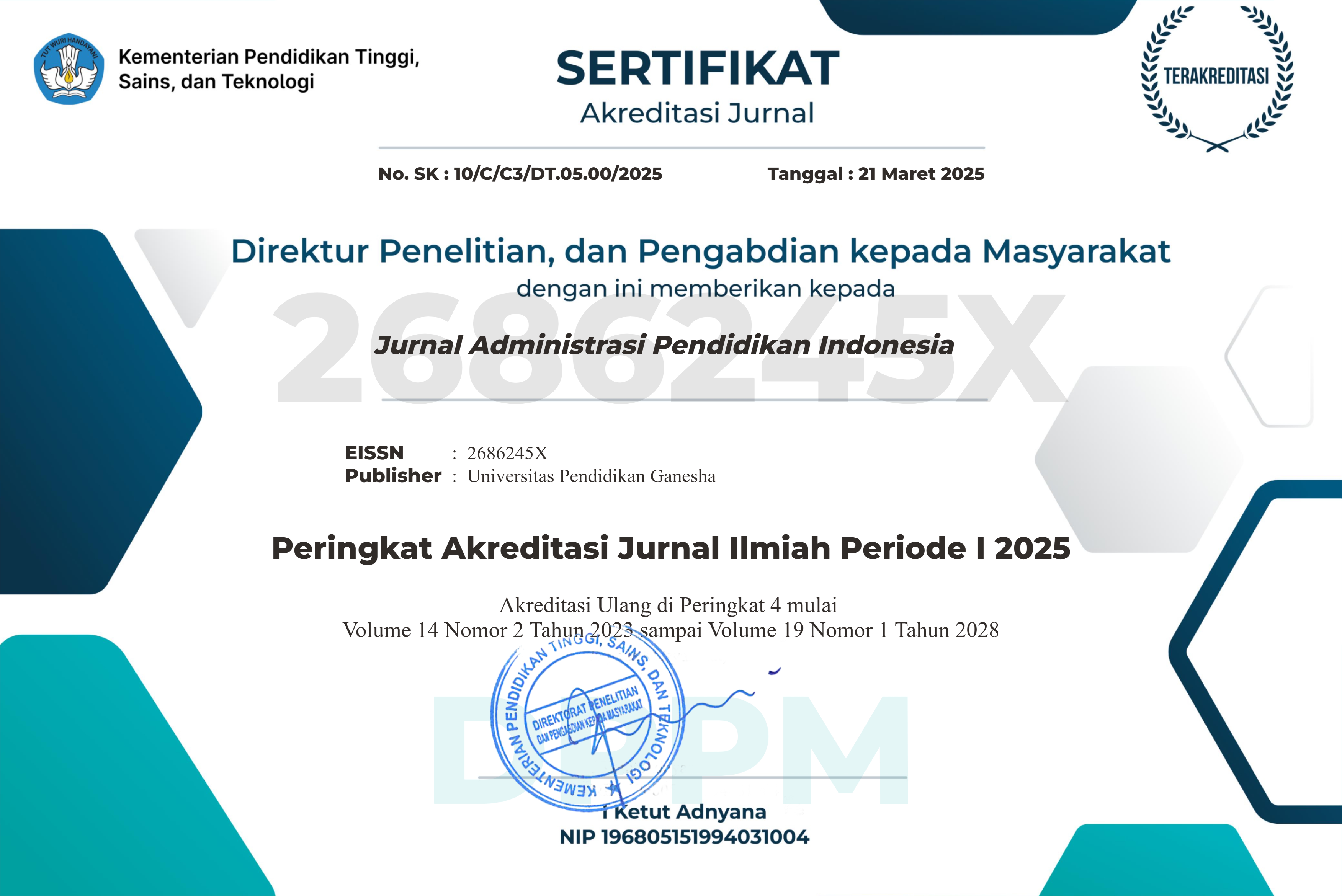The Contribution of Transformational Leadership, Religiosity, School Culture and Emotional Intelligence to the Performance of Muhammadiyah High School Teachers in Bali
DOI:
https://doi.org/10.23887/jurnal_ap.v13i1.970Keywords:
school culture, emotional intelligence, transformational leadership, teachers’ job performance, religiosityAbstract
This research aims to determine: 1) the contribution of transformational leadership towards teachers’ performance, 2) the contribution of religiosity towards teachers’ performance, 3) the contribution of school culture towards teachers’ performance, 4) the contribution of emotional intelligence towards teachers’ performance, 5) the contribution of transformational leadership, religiousity, school culture, and emotional intelligence simultaneously towards the teachers’performance of Muhammadiyah high schools in Bali. The population of this study was 46 teachers. This study is classified as ex-post-facto with descriptive statistics analysis, simple correlation, partial correlation, multiple correlation, and multiple regression data analysis design. Data collection for this study was conducted by using the Five-point Likert scale questionnaire model. The results of the study show that: 1) There is a positive and significant correlation between transformational leadership and teachers’ performance with 0,464 (ryx1) product moment coefficient correlation, 0,324 (ry.x1-x2,3,4) partial correlation coefficient, and 12,94% contribution of transformational leadership towards teachers’ performance, 2) There is a positive and significant correlation between religiosity and teachers’ performance with 0,546 (ryx2) product moment coefficient correlation, 0,354 (ry.x2-x,3,4) partial correlation coefficient, and 18,07% contribution of religiosity towards teachers’ performance, 3) There is a positive and significant correlation between school culture and teachers’ performance with 0,513 (ryx3) product moment coefficient correlation, 0,384 (ry.x3-x1,2,4) partial correlation coefficient, and 16,01%, contribution of school culture towards teachers’ performance, 4) There is a positive and significant correlation between emotional intelligence and teachers’ performance with 0,422 (ryx4) product moment coefficient correlation, 0,316 (ry.x4-x1,2,3) partial correlation coefficient, and 10,88%, contribution of emotional intelligence towards teachers’ performance, 5) There is a positive and significant correlation of transformational leadership, religiosity, school culture, emotional intelligence, and teachers’ performance simultaneously by 57,9%..
References
Agustian, A. G. 2016. ESQ Emotional Spiritual Quotient: Rahasia Sukses Membangun Kecerdasan Emosi dan Spiritual. Jakarta: PT. Arga Tilanta.
Alfisyah, K. D., Anwar, Moch. K. 2018. Pengaruh Religiusitas terhadap Kinerja Karyawan Muslim Kantor. Jurnal Ekonomi Islam, 1(2), 99–107.
Ansar & Masaong. 2011. Manajemen Berbasis Sekolah. Gorontalo: Sentra Media.
Dayakisni, T, dan Hudaniah. 2015. Psikologi Sosial. Malang: UMM Press.
Goleman, Daniel. 2018. Emotional Intelligence. Trans. T. Hermaya. Jakarta: Penerbit Gramedia Pustaka Utama.
Hutagalung, Dhaniel, Masdukiasbari, dkk. Peran religiusitas, Kepmimipinan Transformasional, Kepuasan kerja dan Mediasi Organizational Citizenship Behavior terhadap kinerja Gurut, Volume 2 N0 1.
Komar, A. 2020. iPeningkatan Kinerja Guru Berbasis Budaya Sekolah dan Budaya sekolah Guru. At-Ta’lim: Jurnal Pendidikan, 6 (2), 109–117. https://doi.org/10.36835/attalim.v6i2.362 Diunduh pada Agustus 2021.
Kuswaeri, I. 2016. Kepemimpinan Transformasional Kepala Sekolah. Tarbawi: Jurnal Keilmuan Manajemen Pendidikan, Volume 2 No 2.
Ma'sum, T. 2019. Persinggungan Kepemimpinan Transformational Dengan Kepemimpinan Visioner Dan Situasional. Intizam: Jurnal Manajemen Pendidikan Islam, Volume 2, No.2
Mulyasa. 2012. Manajemen dan Kepemimpinan Kepala Sekolah. Jakarta: Bumi Aksara.
Nashihin, H. 2017. Pendidikan Karakter Berbasis Budaya Pesantren. Semarang: CV Pilar Nusantara iSemarang.
Pianda, D. 2018. Kinerja Guru: Kompetensi Guru, Motivasi Kerja dan Kepemimpinan Kepala Sekolah. Bojonggenteng, Sukabumi: CV Jejak.
Sholeh, M. 2017. Keefektifan Peran Kepala Sekolah dalam Meningkatkan Kinerja Guru. JDMP (Jurnal Dinamika iManajemen Pendidikan), Volume 1 No1.
Sholihah, M., Sunaryo, H., & Priyono, A. A. 2017. Pengaruh Kecerdasan Emosional
dan Kecerdasan Spiritual Terhadap Kinerja Guru SMP An-Nur Bululawang-
Malang. Jurnal Warta Ekonomi, Vol. 7 No. 17.
Siswatiningsih, I., Raharjo, K., & Prasetya, A. 2019. Pengaruh Kepemimpinan
Transformasional Dan Transaksional Terhadap Budaya Organisasi, Motivasi
Kerja, Komitmen Oganisasional Dan Kinerja Karyawan. Jurnal Bisnis dan Manajemen, Volume 2 No 5.
Suhartini, Cucu. 2020. Pengaruh Kepimimpinan Kepala Sekolah dan Budaya Sekolah Terhadap Kinerja Guru, Vol. 4 No 2.
Sukayana I Wayan, Made Yudana, Dewa Gede Hendra Divayana. 2019. Kontribusi Kepemimpinan Transformasional, Supervisi Akademik Kepala Sekolah, Kompetensi Pedagogik Dan Motivasi Kerja Terhadap Kinerja Guru iDi SMK Kertha Wisata Denpasar. Jurnal Administrasi Pendidikan Indonesia.
Wahab, M. A. 2017. Relationships between religious work values, sustainable work behaviours and sustainable energy consumptions: an empirical analysis using Muslim employees. Management Decision, Volume 9 No 55.
Zamroni. 2011. Pendidikan Demokrasi Pada Masyarakat Multikultural. Jakarta: Gavin Kalam Utama.











